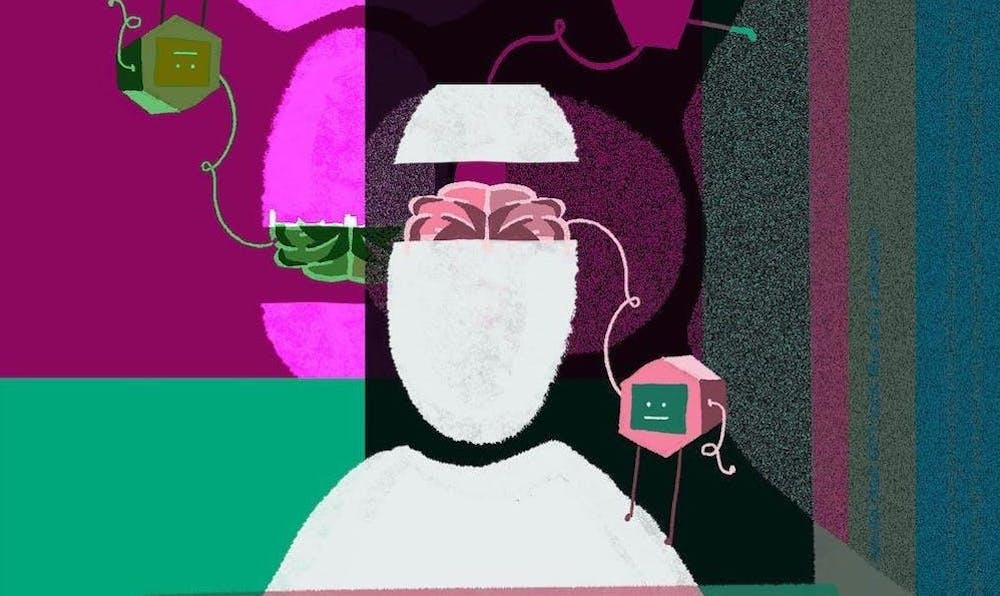On Nov. 2, the Office of the Provost — in partnership with the Data Science Institute — launched a year-long discussion series about concepts related to artificial intelligence and machine learning with a “Let’s Chat about ChatGPT” event.
Part of the “Conversations on AI and our Data-Driven Society” series, the event hosted several University academics, including Assistant Professor of Computer Science Steven Bach, Assistant Professor of Computer Science and Linguistics Ellie Pavlick and Professor of Data Science and Computer Science Suresh Venkatasubramanian. Provost Francis Doyle moderated the discussion, posing questions on AI regulation and history.
“At Brown, we have a rich collection of scholars across the disciplinary spectrum who have brought their distinct perspectives to these conversations, in ways both deep and multifaceted,” Sohini Ramachandran, director of the Data Science Institute, wrote in an email to the Herald.
The series’s goal “is to engage our broader University community in cross-disciplinary discourse about our data-driven world, and stimulate new research, pedagogy and cross-disciplinary interaction around how AI affects and can improve our work and lives,” she added.
The conversation opened with a discussion about the differences between AI and machine learning.
The existence of AI poses the question of whether it’s possible to “replicate human-level intelligence in a non-human thing,” according to Pavlick. Machine learning, on the other hand, uses algorithms and statistical methods to predict outcomes.
Venkatasubramanian has seen the conversations surrounding algorithms and AI rise “in temperature” over the past decade. Today, AI is a “kitchen table issue,” he said. “Everyone (can) see the potential.”
Thursday’s event occurred in the wake of a new executive order by the Biden administration about “managing the risks” of AI while simultaneously promoting innovation in the field. The executive order includes goals to “strengthen privacy-preserving research and technologies” and “catalyze AI research,” according to a fact sheet released by the White House.
Venkatasubramanian has hope for the new executive order. “They’re important steps forward,” he said at the event. “We’re going to have to wait and see how they play.”
Pavlick also highlighted how some regulations can help stimulate growth and innovation. She explained how many companies will simply use another AI model to train their old AI model — but regulations that require different solutions can help fix that, she explained.
Regulations “will actually lead to a lot more diversity of research … (and the) technology that’s being built,” she added.
All panelists highlighted the need to integrate scholarship from multiple disciplines, especially the humanities, into the field of AI.
“This is the time where we actually need philosophers,” Pavlick said. “We have new problems that have not been thought through in this form before.”
“It’s also important for computer scientists to … (learn more) about the world that these tools they’re building are inhabiting,” Venkatasubramanian said, pointing to the computer science department’s socially responsible computing curriculum. SRC “tries to teach CS students how to think more critically about the tools they’re building,” he added.
Upcoming events in the conversation series will include discussions surrounding authorship, power and equity, education and healthcare, Doyle and Ramachandran shared with The Herald.
Identifying how AI can “enhance academic activities … while ensuring these tools are understood and used appropriately and ethically is a regular topic of discussion among our senior academic leaders,” Doyle wrote in an email to The Herald.
“We know that our students will be the ones leading the way when it comes to the future of AI, and it is our academic mission to prepare them accordingly.”

Ryan Doherty is the managing editor of digital content and vice president of The Herald's 135th editorial board. He is a junior from Carmel, NY who is concentrating in chemistry and economics. He previously served as a university news and science & research editor, covering faculty and higher education.





